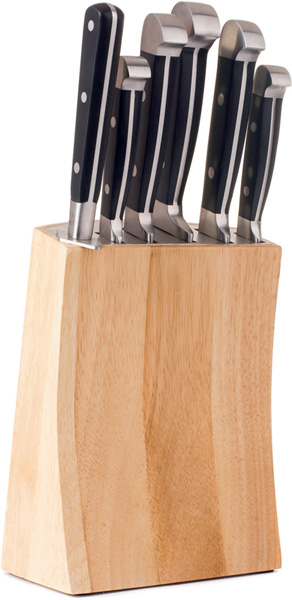Use oven mitts when removing hot food from the oven.
More accidents happen in the kitchen than anywhere else in the home. Cutting yourself with a knife, slipping on a wet floor or burning yourself with a hot pan are among the common dangers. You can minimize the risk of injury by taking a few precautionary measures.
A little care is key to kitchen safety. Learn how to handle sharp kitchen utensils safely and make sure you know what to do in case of emergency. When it comes to stove safety, never leave a pot on the burner unsupervised, especially if you are cooking with gas. Turn off burners immediately after you have finished using them.
• Make sure to position pots and pans carefully on the stove or cooktop so that you can’t knock their handles as you move around the kitchen.
• When heating oil, watch the pan carefully because oil is very flammable. Deep frying is a common cause of kitchen fires.
• Step back and let the hot air escape when you open the oven door.
• Be especially careful not to spill hot liquid when removing pots and pans from the oven. Wipe up any spills on the floor at once so you don’t slip on them.
• Never place hot foods on the edge of the stove, table or work surface where they may tip over.
• Keep dish towels well away from the burners which could set them on fire.
• Wash or replace exhaust fan filters regularly. They can easily catch fire when saturated with grease.
• Keep your hands, face and body out of harm’s way when using the steam release valve on a pressure cooker.
• For safety’s sake, and for peace of mind, it’s best to use a kettle that turns itself off automatically after the water boils.
• Never overheat oil in a deep fryer. Also, replace used oil, as it is more likely to catch fire.
• Make sure the deep fryer’s heating coils are totally immersed in oil or there is a strong risk that the oil will catch fire.
• Run cold water in the sink while draining potatoes or other vegetables so that the rising steam won’t scald your hands.
• Store knives and other sharp objects in a knife block or on a magnetic wall strip out of the reach of children.
• Don’t put knives in dishwater. If they’re obscured by suds where you can’t see them, you could accidentally grab them by the blade.
• Wash knives with a brush right after use. For dried-on food, let knives soak first in a container of warm water.
• Read the instruction manuals to find out how to safely remove the blades from food processors, shredders, slicers, meat grinders and other kitchen devices with blades.
• While cutting, guide the knife away from your body, with your fingertips held at an angle.
• Sweep up broken glass immediately and wrap it in newspaper before putting it into the garbage can. Gather up tiny fragments of glass with a piece of sticky tape wound around your hand.
• If a glass breaks in the dishwater, drain the water through a sieve and rinse away any excess soap suds before removing the pieces.
• Keep household chemicals well out of the reach of children. Make sure that all such chemicals are clearly labelled and don’t store them in food cupboards or in containers that are normally used to store foods.
• Wipe up splattered grease and spills on the floor immediately so no one slips.
• If something does go wrong, remain calm.
• Smother the flames of an oil fire with a thick, damp dish towel or a pot lid, and remove the pan from the heat source. Don’t use water or a foam fire extinguisher on the flames, as this has the potential to splatter the oil outside the contained pan and spread the flames.
• Turn off the oven immediately in the event of an oven fire. Keep the oven door closed—the lack of oxygen will suffocate the fire.
• Treat bruises from a fall by applying a cold pack or a bag of ice wrapped in a towel. Never apply ice cubes directly to skin as it will burn.
Note: For severe falls, seek professional advice.
• For a minor burn or scald, run the area under cool water for 10–30 minutes to prevent it from getting worse. Do not use ice, creams or greasy substances.
• Cover the burn with a single layer of plastic wrap; a clean, clear plastic bag is suitable for covering burns on the hand. Do not interfere with the burn or break any blisters.
Note: For severe burns, go to the emergency room immediately.
• Stop bleeding by applying a clean dish towel or wad of paper towels and pressing hard on the spot. Clean it by holding the part of your body that is injured under cold running water. Cover with an adhesive bandage and some antibiotic cream to prevent infection.

A KNIFE BLOCK KEEPS sharp edges AWAY FROM small fingers.
GOOD TO KNOW 
Don’t try to treat poisoning with home remedies
In the event of someone being poisoned—or if you suspect someone may have been poisoned—call a doctor or poison control center immediately. Don’t attempt treatment unless you are advised to do so. Prompt action can save a victim’s life, so don’t wait to see if the symptoms improve or worsen.